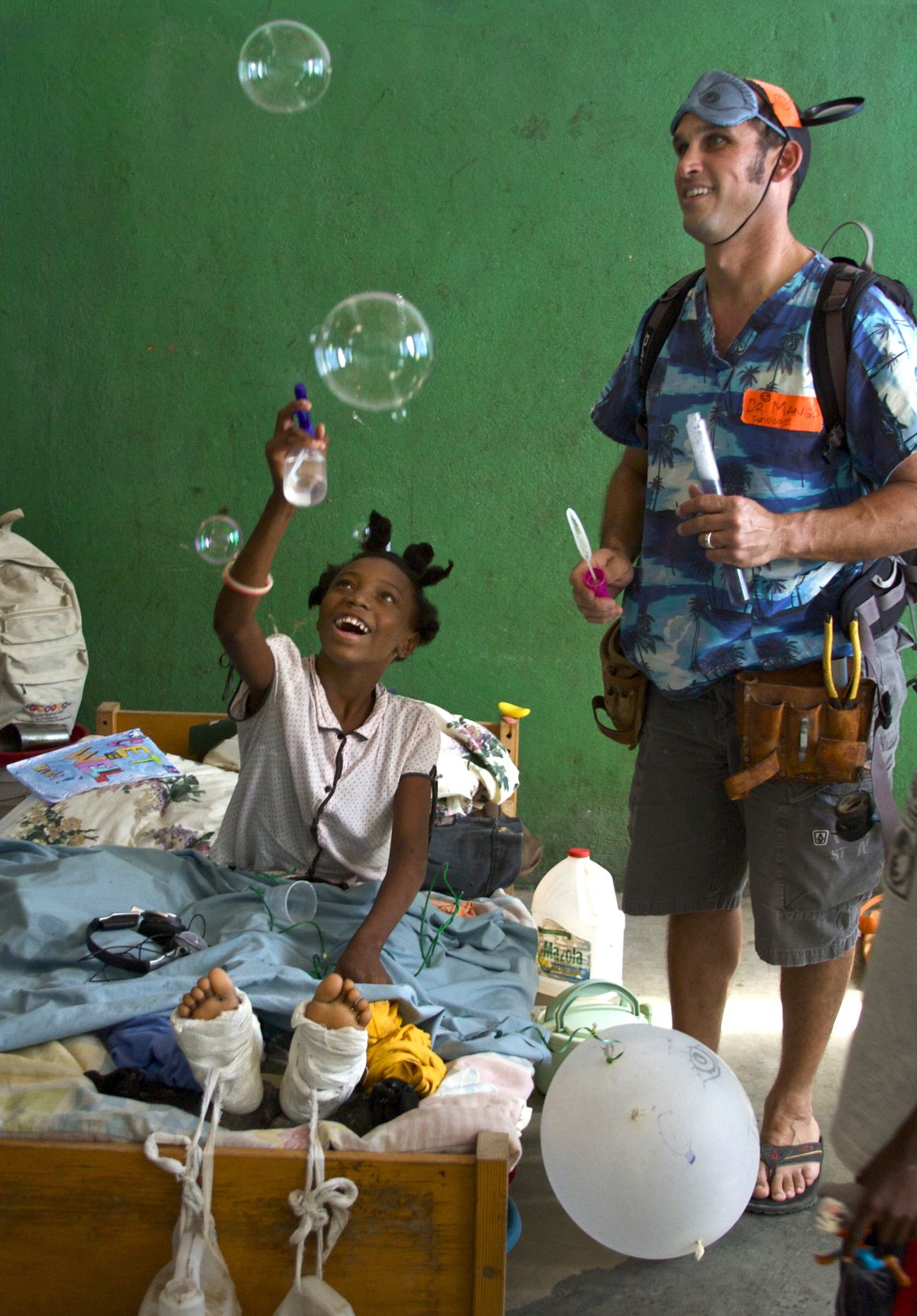Aid for Haiti: canes, crutches, walkers

Almost two months after the earthquake uprooted the lives of their nation, people across Haiti still struggle finding basic needs for everyday life. Medical supplies, shelter, and food and water are just some of the immediate concerns in the wake of any natural disaster, such as the Jan. 12 7.0-magnitude temblor that rocked the island nation and the recent 8.8-magnitude quake that shook Chile.
With help from people around the world, including North Idaho, the immense undertaking of rebuilding lives in Haiti is slowly taking shape through monetary and other donations. Yet, considering the wide-ranging aftermath – a devastated country that long before disaster hit was in the clutches of a corrupt government and a poor economy, and now under the added weight of the needs of thousands upon thousands of refugees – helping Haiti will take a long-term commitment.
Dr. Mike Ettner, who recently returned after a one-week stint in Haiti, is dedicated to that long-term task. As part of a national collection drive, Ettner, a physician from Kootenai Medical Center, is setting up a medical supply drive in the area to help out the tens of thousands of new Haitian amputees by collecting new or gently used crutches, canes, walkers and knee braces.
“We always have a need for canes and crutches and walkers, but especially now. We’d like to send a shipment as soon as possible,” he said.
While the earthquake was without question a crushing blow to the people of Haiti, at least some small good came from it, Ettner said: the international attention that was turned on a country long plagued by poverty and political strife. With the focus still on the earthquake-ravaged region, he’s hoping to amass a truckload of the medical supplies as soon as possible. Once enough items are collected, a trucking company has offered to transport them free-of-charge to Miami, where Royal Caribbean cruise ships will then ship them to Haiti, also for free.
“I want to strike while the iron is hot because if we can ship it while it’s free, why not take advantage of that?” he said.
At the end of January, Ettner led an all-volunteer team of medical professionals to Haiti through the Haiti Endowment Fund, a nonprofit, nondenominational mission organization that’s been helping provide basic needs and ministry for Haitians for roughly 25 years. The group provided health checks, surgical support and medical attention during their stay. In addition, they brought along 50 storage bins full of donated medical supplies, such as pain medication, gauze and antibiotics.
“It was overwhelming,” Ettner offered about their time in Hinche, a city 45 miles north of the capital Port-au-Prince that had a population of about 30,000 before the earthquake.
Now, due to the flood of refugees that poured out from the capital after the quake, there are some 200,000 Haitians in and around the city and surrounding countryside. In the city’s rundown hospital, which has 150 beds, patients line the halls and crowd the rooms as staff and outside aid workers struggle with more than double the typical patient loads. The stench of decomposing bodies and festering wounds hung like a cloud over the hospital. The amount and levels of trauma, shattered arms, crushed femurs, broken ribs and other body parts, and infected wounds, was staggering, Ettner said.
“We know there are about 30,000 new amputees,” he explained. About treating the patients, he added, “the first stage was trauma, but now it’s (dealing with) infection.”
Adding to the anguish of the caregivers were the faces of children mixed in with the injured. “What brought many on the team to tears was the amount of pediatric trauma – children with broken bones and other wounds.”
Using a term he uses often in describing the scene, Ettner reiterated “it’s just overwhelming.”
To deal with so much sorrow and heartache, a few volunteers from the medical and construction teams formed a clown group to try and lift hard-hit spirits. Even though the children were in pain, some with burns over large portions of their bodies, most in casts and bandages, “they were laughing and having a great time,” Ettner recalled. “It was one of the best parts about the trip.”
But that’s the nature of the Haitian culture; they have an enduring spirit, according to Cody Lemieux, a North Idaho College student who’s spent more than a year in the country.
“Haitians are an amazing people,” he offered. “They can take anything and joke about it and just keep going. They have just an innate attitude of enduring because of their everyday struggles.”
Lemieux said he hopes people in the U.S. continue to offer donations to those affected by the disaster. In talking with friends in Haiti, they told him supplies are trickling into the outlying areas, including Gros Morne, which is now home to a swell of refugees. He knows times are tough for people here, but he said anything, whether it’s crutches or money, will make a difference. “Every little bit helps,” he added.
Ettner echoed that point. “It’s a painful time for people in the U.S., and yet they see that people in Haiti are much worse off and they want to help,” he said. After seeing and experiencing the generosity of others firsthand, he added, “The response worldwide has been really amazing, and here in Coeur d’Alene as well.”